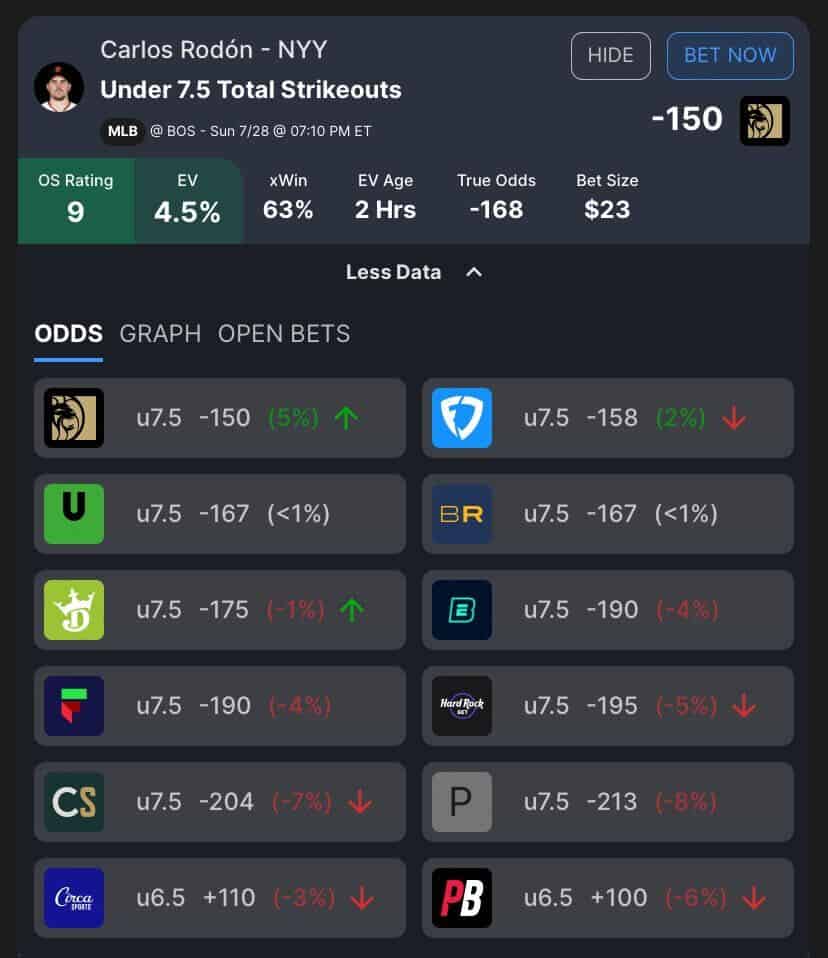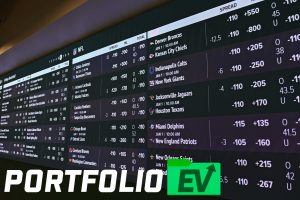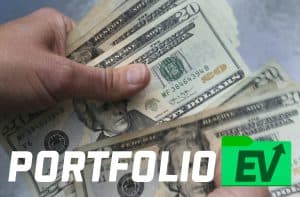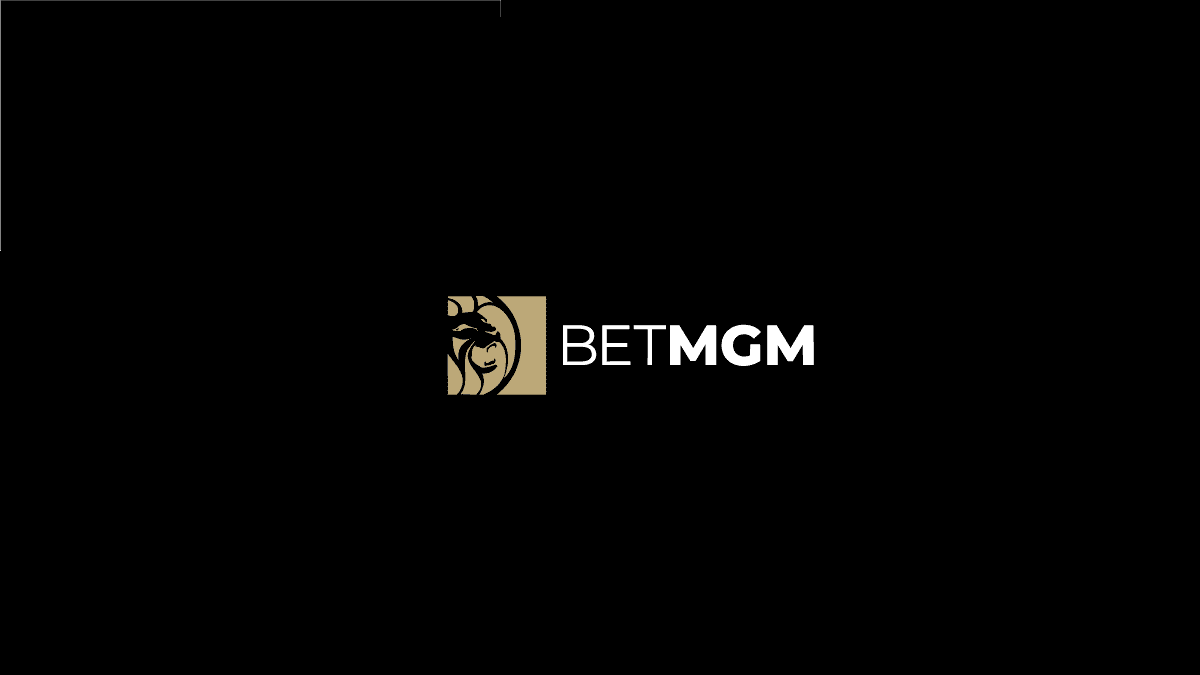So, you want to start betting on sports. Maybe you’ve been betting on sports for a while, but you want to start winning. Becoming a profitable sports bettor on your own is difficult, but the process — at least in the abstract — is a simple one: You want to find bets that will win and place them. Today, I’ll walk you through how to bet on sports as we dive into a five-step profitable sports betting strategy. Portfolio EV will do most of the hard work for us.
How to Bet on Sports: Profitable Betting Strategy Tips & Advice
How to Bet on Sports: Five Steps to Turn a Profit
Step 1. Choose a Sportsbook
The first step to becoming a profitable sports bettor is to sign up with a sportsbook. If you haven’t done so already, I’ve included a list of the best sportsbook sign-up promotions below:
To help you make an informed decision about which book to start with, we have a series of reviews that can check out:
Personally, I recommend playing at multiple books. That way, you can take advantage of the book with the best price and capitalize on sign-up offers. Sports betting odds are rarely the same everywhere, and that market inefficiency is something we can exploit — more on this later.
Step 2. Choose a Sport
Once you’ve chosen your sportsbook, you should choose an in-season sport to bet on. You don’t have to specialize, but specialization is the best way to figure out if you have an edge, especially early on. Further, you can’t place a bet without, you know, picking one.
You can bet on almost any sport at public sportsbooks, from professional basketball to college hockey. Sportsbooks will often limit the amount of action you can get down on more niche sports, but if you’re a new bettor, that probably won’t be an issue.
At our site, you can find profitable MLB bets, NBA bets, NFL bets, WNBA bets — and so much more. But how do we know those bets are profitable? That’s easy — we have a sports betting model and track its results.
Step 3. Calculate Expected Value
After you’ve chosen a sport to target, it’s now time to actually dig up the bets you’re going to place. To do so, you have to figure out what the expected value of a given bet actually is. In a sports betting context, you can calculate expected value by subtracting the implied odds of an outcome from your estimate of that outcome’s probability.
That means you must estimate the probability of that outcome on your own. There are two main ways to do this: you can take a projection-based approach or a market-based approach.
A projections-based approach involves using statistics and other sports-related data to calculate the probability of a given outcome. If you were betting based on ESPN’s projected win probability, you’d be using a projections-based approach. Many sports bettors like to build sports betting models on their own to make projections.
Instead of using statistics, a market-based approach uses the odds available at different sportsbooks to calculate the probability of a given outcome. While this approach is entirely disconnected from what happens on the field (or court, or track), it can be profitable — perhaps even more than projection-based approaches — over the long term.
Our industry-leading sports betting model uses a market-based approach to calculate expected value.
Step 4. Find Positive Expected Value
Once you (or your model) have calculated the expected value of your bet, one of three things can be true — you can have positive expected value (+EV), no expected value or negative expected value (-EV). If a wager falls into the first category, congratulations, you’ve found a bet worth placing!
Now, let’s talk about how to actually find +EV bets and how much you should bet on them.
To do so, we’ll walk through how Portfolio EV identifies +EV bets. Note that employing a consistent method is crucial to both backtesting your approach and ensuring you achieve your expected returns over the long run. A lack of consistency or discipline will make reaching your projected returns quite difficult.
Here is a look at the best bets on a given date, per Portfolio EV:
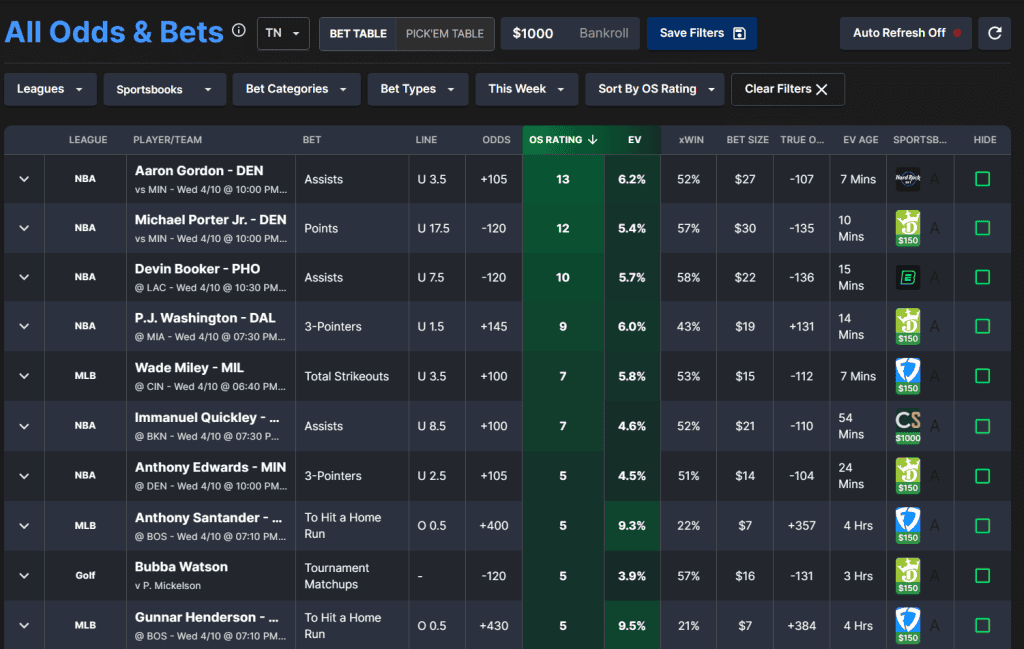
Here, you see a sampling of bets from across the wide world of sports: this screenshot was taken in April, and we’ve got +EV bets for the NBA, MLB and PGA all on the same page. You can choose to sort by sport, sportsbook, bet type and more to help you find the bets you want to place.
Now, let’s look at an example wager to describe the sports betting strategy behind how Portfolio EV calculates expected value:
In this example, Carlos Rodon to stay under 7.5 strikeouts at -150 is the +EV bet the model has identified. It believes this is a +EV bet because our market-based betting system has found the probability of Rodon staying under 7.5 strikeouts to be higher than the -150 (60%) available at BetMGM.
The model calculates the probability of this outcome, which we call true odds, by indexing the odds from across the market, adjusting for hold (the amount sportsbooks charge you to place a bet) and weighing book sharpness (yes, some sportsbooks have more accurate odds than others).
Once we have a bet’s true odds, we can calculate the expected value we’re getting on that wager. Our model believes we’re getting 4.5% EV here (good for an OS Rating of 9), which, if you have a bankroll of $1,000, means that you should wager $23 on this bet for the optimal outcome over the long term.
Just because this is +EV bet at BetMGM doesn’t mean it’s a +EV bet everywhere. Our model says that the -175 at DraftKings is actually a -EV bet because the odds at their book are higher than Rodon’s true odds of staying under 7.5 strikeouts.
The concept of the same bet being +EV at one book but -EV at another may be confusing. So instead of thinking about bets in terms of what will happen, think about them in terms of what might happen. There is no such thing as a lock.
Of course, just because I tell you that something is +EV doesn’t necessarily mean it is. So, how can you trust me — and or model?
There is an easy answer to that question: results. Our +EV betting results are free to access. In the 2023-24 NBA season, we scored a 7.6% average ROI on 63,002 bets with an OS Rating of 2 or greater:
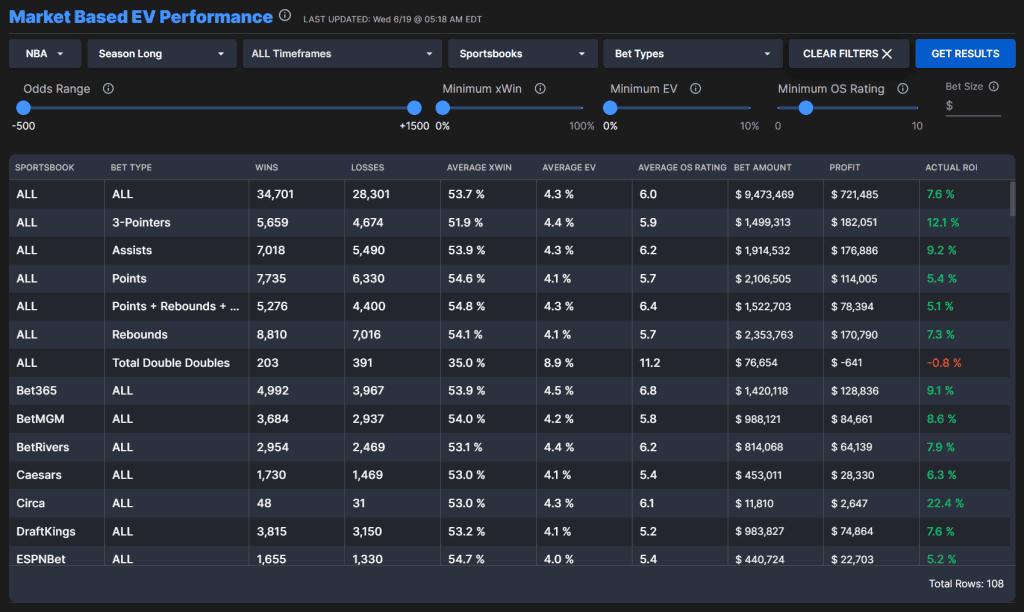
You can use the +EV betting results tool to project your own returns from using Portfolio EV. I recommend doing so before subscribing — that way, you know whether you should be able to pay off your weekly or monthly subscription with profits from our tools.
Step 5. Secure Compounding Returns
The magic of sports betting, especially as an investment tool, is that you have a chance to find +EV bets every day. If you can get even an average return of 2% on all of your bets each day, that can add up quickly due to the nature of compounding returns.
It’s often tempting to profit $1,000 then pull that money out of the sportsbook to spend on something else. But if instead of spending that money you chose to keep it in your bankroll and wager it on even more +EV bets, that $1,000 could turn into $1,020 the next day, $1,040 the day after that, and, after a month of 2% returns, $1,776.
As I showed you above, we scored an average return of 7.6% on NBA bets in the 2023-24 season. The NBA season isn’t year-long (and the playoffs, which don’t feature as many games, do drag on for a while), so let’s assume we had half a year of +EV bets to work with.
If we started with $1,000 and scored the average return of 7.6% every day, we would have $1,076 after a day, $1,552 after a week, $9,003 after a month and $494,762,264 at the 180-day mark. Obviously, the sportsbooks would have limited you far before then if those were your actual returns, but this example illustrates the importance of taking the long view in betting.
Concluding Thoughts on Profitable Sports Betting Strategy
Becoming a profitable sports bettor isn’t easy, especially if you’re trying to come up with a sports betting strategy on your own. You need to take a consistent approach to calculating expected value while remaining disciplined about your bet sizing. Avoiding cognitive biases is crucial, too — you can’t fall into the trap of the gambler’s fallacy.
At OddsShopper, we let our +EV betting results speak for themselves. If you want to get in on the action with our profitable sports betting strategy, subscribe to Portfolio EV today.

